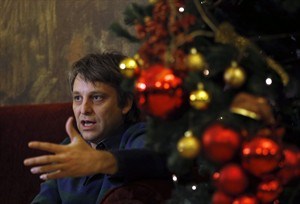
In this photo taken Wednesday, Jan. 14, 2015, Serbian screenplay and director Vuk Rsumovic speaks and gestures during an interview with The Associated Press in Belgrade, Serbia. Based on a true story, No One’s Child, the first feature film by Rsumovic, has captured hearts and minds of both audiences and critics at international festivals, from Venice to Palm Springs, where he won the The New Voices/New Visions award this month. (AP Photo/Darko Vojinovic)
January 20, 2015 - 2:30 AM
BELGRADE, Serbia - He could have been a Serb, a Croat, or a Muslim. It didn't really matter. Not until the war broke out.
Then the feral child, found by hunters in the Bosnian forests and raised in a social care centre in Serbia, was forced to return to Bosnia, where his randomly chosen name would determine his destiny.
"No One's Child," the first feature film by Serbian director Vuk Rsumovic, is based on a true story which unfolded during the Yugoslav ethnic carnage of the 1990s. Exposing the senseless brutality of war through the eyes of a boy of undetermined ethnicity, it has captured the attention of critics at international festivals — from Venice to Palm Springs, where Rsumovic won The New Voices/New Visions award.
But it remains to be seen if the film, which opens at cinemas across the Balkans next month, can win the hearts of the home audiences in Serbia and Bosnia — the former foes still reeling from the conflict.
"He can see people killing each other, but he can't tell the difference. They are all the same to him," Rsumovic said of the boy. "The absurdity of it all becomes clear when you look at the war from his perspective."
The bloodshed in the former Yugoslavia erupted when the ex-federation's Serbs, Croats and Muslims turned against one another and moved to create own states. More than 100,000 people were killed and millions were made homeless in the 1991-95 conflict, which was Europe's worst since World War II.
The tale of "No One's Child" began when Yugoslavia was still intact in 1988.
Authorities in Bosnia — one of the six Yugoslav republics — were unsure what to do with a gnarling, crouching child found in the woods, so they decided to send him to the central authorities in Belgrade, the capital of Yugoslavia located in the Serbian republic. For no particular reason, a local official named the boy Haris, which is a common Muslim name in Bosnia.
Cleaned and dressed, but still unable to communicate, Haris began his transformation in a centre for abandoned children in Belgrade. He started school and made friends, when after more than four years, authorities in his native Bosnia — now an independent country ravaged by war — sought him back for unknown reasons. He returned to the chaos, to be picked up to fight by a group of soldiers declaring that "your name is Haris, so you are one of us."
Rsumovic said he first heard about Haris from the boy's former mentor in the child care centre. The story differed from other feral children tales because it came to symbolize "generations whose lives fell apart along with their country," Rsumovic said in an interview with The Associated Press.
The Palm Springs jury said they were "deeply impressed by this compelling, multilayered and assured" film about a "personal, intimate tale set in a time of historical turmoil." The jury also singled out "an astonishing performance by Denis Muric," the Bosnian actor who plays Haris.
"No One's Child" had its Balkan debut at the Zagreb Film Festival in Croatia, where it won the audience award in October. "It is as if the film tells us that in this region, the only way to survive is to be no one, to be 'wild,'" Croatian film critic Jurica Pavlicic wrote.
News from © The Associated Press, 2015